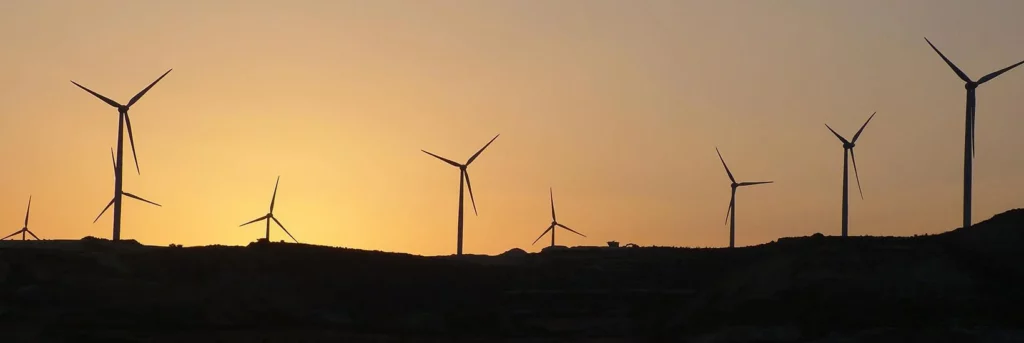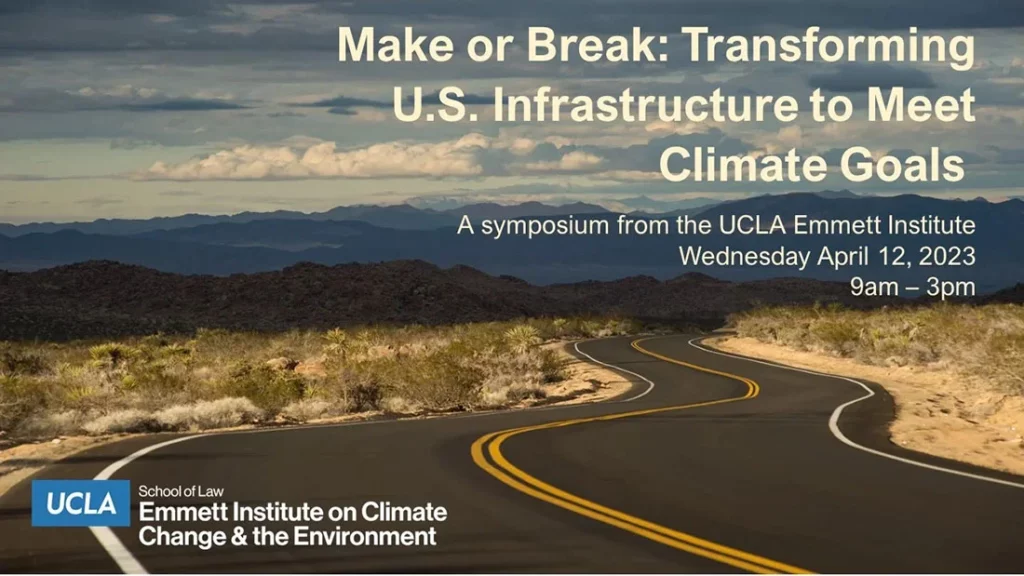
Make or Break: Transforming U.S. Infrastructure to Meet Climate Goals
Join the UCLA Emmett Institute’s annual symposium on Wednesday, April 12 to explore the new laws that are driving the clean energy transition.
-
Buckle up. The transition to cleaner energy is speeding up and a pair of recent climate laws promises to really put America’s foot on the accelerator. But how these laws are implemented at the local, state, and national level will determine whether the U.S. can meet increasingly urgent climate goals as well as benefit communities that historically have been left behind.
Join the UCLA Emmett Institute’s annual symposium on Wednesday, April 12 to explore the new laws that are driving the clean energy transition. We’ll focus on implementation of the Inflation Reduction Act (IRA) and the Infrastructure Investment and Jobs Act (IIJA). You can RSVP now.

A two-lane empty highway in the desert with mountains in the background. Superimposed on the image are the words: Make or Break: Transforming U.S. Infrastructure to Meet Climate Goals; A symposium from the UCLA Emmett Instute, April 12, 2023, 9am-3pm. The Emmett Institue logo is also superimposed on the image
Leading lawyers, energy experts, environmental advocates and architects of climate legislation will share their visions for an ideal infrastructure and how to build it. What’s the role of new legal mandates and economic incentives? How can local communities play a role in this development? How can lawyers and policymakers reduce the negative effects of such unprecedented growth? Big changes are coming to every state, city and household as a result of the IRA and IIJA. This event will provide policymakers with ideas for implementation and give students and climate-minded professionals insight into the process.
This day-long symposium at the UCLA School of Law is free and open to the public. It kicks off with a keynote address by David J. Hayes, former Special Assistant to the President for Climate Policy in the Biden administration, followed by the three panel discussions detailed below.
UCLA School of Law is a State Bar of California approved MCLE provider. These sessions may qualify for MCLE credit. A request for approval is currently pending.
Schedule:
8:20-8:50 AM: Breakfast and Check-In
9:00-9:40 AM: Opening Remarks
9:40-9:50 AM: Morning Break
9:50-11:00 AM: Panel 1: Dreaming Big: How IRA and IIJA Can Help Build an Infrastructure for the Future
11:00-11:15 AM: Morning Break
11:15- 12:25 PM: Panel 2: Transmission Case Study: Remaking our Power Grid for Renewable Energy
12:25-1:25 PM: Lunch
1:25-2:35 PM: Panel 3: Transportation Case Study: Decarbonizing Planes, Trains, and Automobiles
2:35-2:45 PM: Afternoon Break
2:45-3:00 PM: Closing Remarks
3:00-3:45 PM: Reception
Keynote Speaker:
David J. Hayes is Lecturer in Law at Stanford Law School and a Senior Fellow at NRDC. Hayes is the former Deputy Secretary of the Interior, and recently served in the Biden Administration as Special Assistant to the President for Climate Policy. He assisted in developing and implementing climate-related provisions of the IRA and IIJA. He’s an expert in the consideration and permitting of energy projects on public lands and waters.
Panel 1: Dreaming Big: How IRA and IIJA Can Help Build an Infrastructure for the Future
The Biden administration’s Build Back Better agenda was a broad framework for remaking the nation’s social, economic, and environmental policies. The end result is legislation that’s smaller in scope, and yet the IRA and IIJA create unprecedented new incentives for remaking our energy and transportation infrastructure to address climate change. Our first panel of the day will think big about the main energy and transportation goals behind these two laws and the key provisions in each to achieving those benchmarks. What are the most important implementation decisions that must be made to meet the moment? What are the biggest obstacles? This panel will put the IRA and IIJA into the context of existing environmental laws and ask how to facilitate implementation.
Panelists:
Sylvia Chi, Senior Policy Analyst at Just Solutions Collective
Kimberly Clausing, Eric M. Zolt Chair in Tax Law and Policy at the UCLA School of Law
Dustin Maghamfar, Federal Program Director at Energy Foundation
Jim Salzman, Donald Bren Distinguished Professor of Environmental Law at the UCLA School of Law and UC Santa Barbara
Moderated by: Cara Horowitz, Andrew Sabin Family Foundation Executive Director of the Emmett Institute on Climate Change and the Environment
Panel 2: Transmission Case Study: Remaking our Power Grid for Renewable Energy
As the nation transitions from fossil fuels to clean energy, the transmission infrastructure that forms the backbone of our power system must expand to meet growing electricity needs. This panel will explore what a grid that is fully equipped to support our transition to clean energy looks like, and how to achieve it. The IRA and IIJA provide loans and funding for the improvement of transmission, grid flexibility, and resilience. How can we implement these laws to best meet our transmission goals? Are there regulatory and other impediments to the construction of critically important energy transmission infrastructure and, if so, how can we overcome them? In rapidly expanding our transmission grid, how should we incorporate community input and respond to local concerns?
Panelists:
Jennifer Chen, Senior Manager, Clean Energy at the World Resources Institute
Karen Douglas, Commissioner at the California Public Utilities Commission
Jeremy Hargreaves, Principal at Evolved Energy Research
Moderated by: William Boyd, Michael J. Klein Chair in Law at the UCLA School of Law; Faculty Co-Director of the Emmett Institute; Professor at UCLA’s Institute of the Environment and Sustainability
Panel 3: Transportation Case Study: Decarbonizing Planes, Trains, and Automobiles
Transportation is the top contributor to greenhouse gas emissions in California, so it’s important to electrify the transportation sector quickly. The IRA and IIJA will invest almost $700 billion in programs relating to transportation, but it remains to be seen how that money will be spent—and toward what aims. This panel will ask what changes we should be seeking to achieve with these investments and how to achieve those goals. Which transportation programs could or should see the most funding? How much should we redesign American infrastructure away from the automobile, versus prioritizing a transition to electric vehicles? How much leeway will cities, states and local communities have to shape their transportation infrastructure improvements? And how do we ensure transportation development serves communities that have historically been left behind? This panel will drill down on the intersection of electrification and urban planning.
Panelists:
Hilary Norton, Chair of the California Transportation Commission and founding Executive Director of FAST
Beth Osborne, Director of Transportation for America
Regan Patterson, Assistant Professor of civil and environmental engineering at the UCLA Samueli School of Engineering
Moderated by: Jonathan Zasloff, Professor of Law at UCLA School of Law
